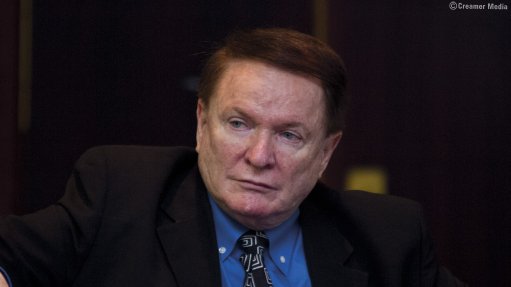
Professor Raymond Parsons
Photo by: Creamer Media
As a result of various economic and political factors over the past three months, which generated a renewed degree of policy uncertainty, the North-West University (NWU) Business School’s Policy Uncertainty Index (PUI) rose to 51 index points in the second quarter, compared with 49.6 in the first quarter.
This rise in the PUI, Professor Raymond Parsons suggested, may be reversible provided more tangible evidence begins to emerge of tackling the structural reforms that are needed to see South Africa exit its low-growth trap.
How the land reform issue is managed will be an important determinant of future levels of policy uncertainty and investor confidence, while a sustained strengthening in investor and business confidence depends on both economic recovery and structural reform, he pointed out.
However, Parsons warned that the official emphasis on rebuilding investor confidence remains key to South Africa raising its game in a highly competitive world.
The prospects for a global trade war and higher global interest rates, he added, may also create headwinds for the South African economy in general and its currency in particular.
“The more South Africa’s house is in order, the better its ability to manage any global economic headwinds.”
According to the PUI, Standard & Poor’s Global Ratings and Fitch have both left South Africa’s rating at sub-investment grade with a stable outlook.
“Both credit rating agencies recognised the recent positive political changes, but believed that South Africa still faced considerable economic and social challenges,” the index noted, stating that these assessments imply that the negative growth figures for the first quarter suggested that the country’s growth challenges are more formidable than originally thought.
The continued problems at State-owned enterprises like Eskom, with its financial and management challenges, industrial conflict and renewed load-shedding, have also detracted from the initial euphoria around political change in South Africa.
Since the start of this year, both business and consumer confidence have sagged, the index lamented.
“The climate of policy uncertainty has been buffeted by a cross-current of positive and negative factors in the past quarter, which eventually contributed to subsequent lower confidence levels”.
According to rating agency Moody’s, South Africa’s growth prospects will be limited by weak business confidence, while uncertainty around land and mining reforms remain a concern for investors.
Further, the PUI noted that, on the one hand, business and consumer confidence was initially boosted by the political changes that took place and the election of Cyril Ramaphosa as President of South Africa in mid-February, leading to a generally more positive national mood.
There have also been various actions taken by the new administration in the past few months to address State capture and other forms of widespread corruption. This all led to a so-called 'Ramaphoria' for a while, which now appears to be wearing off, the index lamented on Wednesday.
The index also stated that while some recent policy developments contain genuine and necessary elements of reform and transformation, several also lead to greater uncertainty.
These include issues such as land reform, the revised Mining Charter, the National Health Insurance proposals, the continued Eskom saga and political factionalism.
These factors, the PUI said, are not all of immediate or equal importance to the policy environment, but their simultaneous impact might explain the persistence of an undercurrent of policy uncertainty in South Africa and why the PUI has moved back into negative territory.
“It is inevitable that a period of political and economic change will produce an initial ebb and flow in the level of policy uncertainty”.
However, the NWU Business School stated that the 2018 second quarter PUI move into negative territory could well be temporary and reversible.
“There remains much goodwill around the Ramaphosa Presidency in the markets and within business. The recent positive investment decisions by companies like Mercedes-Benz and Old Mutual show that the policy environment still has its encouraging aspects for businesses”.
In the wider picture, however, a reduction in policy uncertainty will depend on tangible evidence that structural reforms are indeed being addressed and that capacity is being developed to implement them, the PUI warned.
“A sustained strengthening in investor and business confidence depends on both economic recovery and structural reform. South Africa needs to raise its game in a highly competitive world and the official emphasis on rebuilding investor confidence remains the key to that outcome”.